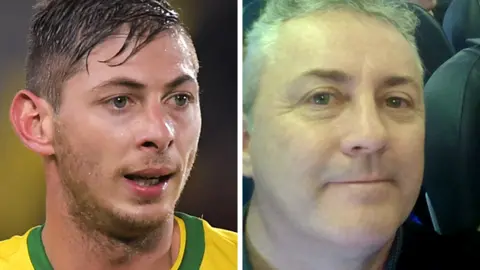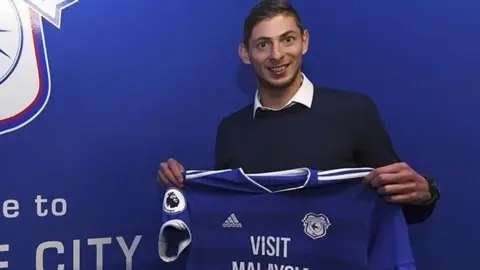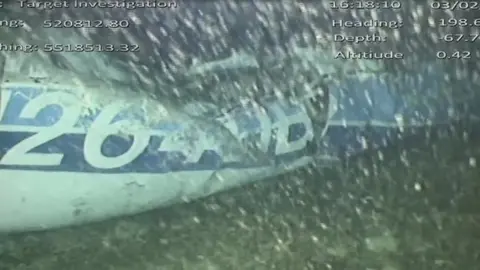Emiliano Sala crash: Unlicensed charter flights happen 'every day'
 Getty Images/David Ibbotson
Getty Images/David IbbotsonUnlicensed charter flights happen every day and the death of Emiliano Sala should serve as a "watershed moment", an industry association has said.
The footballer and pilot David Ibbotson crashed in the English Channel in 2019.
Air accident investigators said on Friday neither Mr Ibbotson nor the plane had the required licences.
Dave Edwards, chief executive of the Air Charter Association (ACA), said in a commercial environment, the flight would have been stopped.
"If you look at the sequence of this particular flight, it's plain to see the difference that a legal charter would have made over this illegal flight," he said.
"The industry has said for a long time that there's an illegal element and sometimes it's quite difficult to quantify... but we know that it occurs, those of us who work on airfields see it every day."
Striker Sala, 28, signed for Cardiff City from French side FC Nantes and visited the Cardiff City Stadium on 18 January.
He was heading to his first training session with his new club at the time of the fatal crash.

His body was later recovered underwater from the wreck of the plane, but Mr Ibbotson's body has not been found.
The Air Accidents Investigation Branch (AAIB) report found the plane began to break up in mid-air near Guernsey as Mr Ibbotson tried to regain control.
It is believed lethal carbon monoxide gas was leaking into the cabin through the plane's heating system, probably from the exhaust.
The report revealed the 59-year-old gas fitter, from Crowle in North Lincolnshire, had no valid licence to fly the plane that night - with or without a passenger.
His rating for that type of aircraft had expired in November 2018, invalidating his private pilot's licence for flying the plane.
He was not qualified to fly at night and inexperienced at flying using the plane's instruments.
The investigation concluded "neither the plane nor the pilot had the required licences or permissions to operate commercially".
It concluded: "The pilot's ability to control the aircraft was probably impaired by the effects of CO poisoning, but he appeared to have some level of function at a late stage of the flight.
"The pilot's lack of training in night flying and recent practice in instrument flying is likely to have increased the risk of loss of control."
As a private pilot flying a US-registered plane, Mr Ibbotson was not licensed to carry passengers unless in a "cost-sharing" arrangement, whereby pilot and passenger have "common purpose" for making the journey and share the cost equally.
Investigators found "significant evidence" he was expecting to be paid, which could have influenced his decision to push ahead with the flight at night and in poor weather.
Arrangements for the flight were made "via a third party who asked the accident pilot whether he would be interested in flying the outbound and inbound flights".
 AAIB/PA
AAIB/PAThe plane had undergone its annual maintenance check at the end of November 2018 - about 11 flying hours before the flight.
If it had been operating commercially, it would have been subject to stricter maintenance requirements than those for private aircraft.
No permission had been sought to use the aircraft commercially and it was "not being operated in accordance with safety standards applicable to commercial operations".
Issues reported by Mr Ibbotson from France included an oil leak from the engine, a problem with the brakes and a malfunction of the stall warning system, which was sounding for the final 10 minutes of the flight to Nantes.
The source of the carbon monoxide found in Sala's blood could not be confirmed, but all possibilities except one had largely been discounted.
"The most probable cause was considered to be exhaust gases leaking into the heater muff with the cabin heating selected on."
'Enforcement is challenging'
In one of several recommendations, the report calls on the Civil Aviation Authority (CAA) to "maintain accurate and up-to-date records" for pilots' licences, certificates and ratings.
The CAA's database listing for Mr Ibbotson's flying licences and ratings was "incomplete and contained numerous errors… this mismatch between database records and a pilot's licence is not unique and previous AAIB investigations have encountered similar discrepancies".
The report notes the CAA is not required to have any oversight of US-registered planes based in the UK.
Unlicensed charter flight operations - also known as grey charters - are becoming more widespread according to the ACA.
They are often associated with sporting events such as race meetings and may be uninsured due to their unregulated nature.
The AAIB report said: "Due to the unlicensed nature of such flights, it is difficult to gauge the level of activity accurately.
"Enforcement is challenging because it requires a large commitment of resources."
